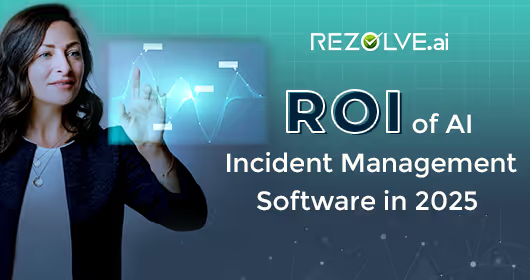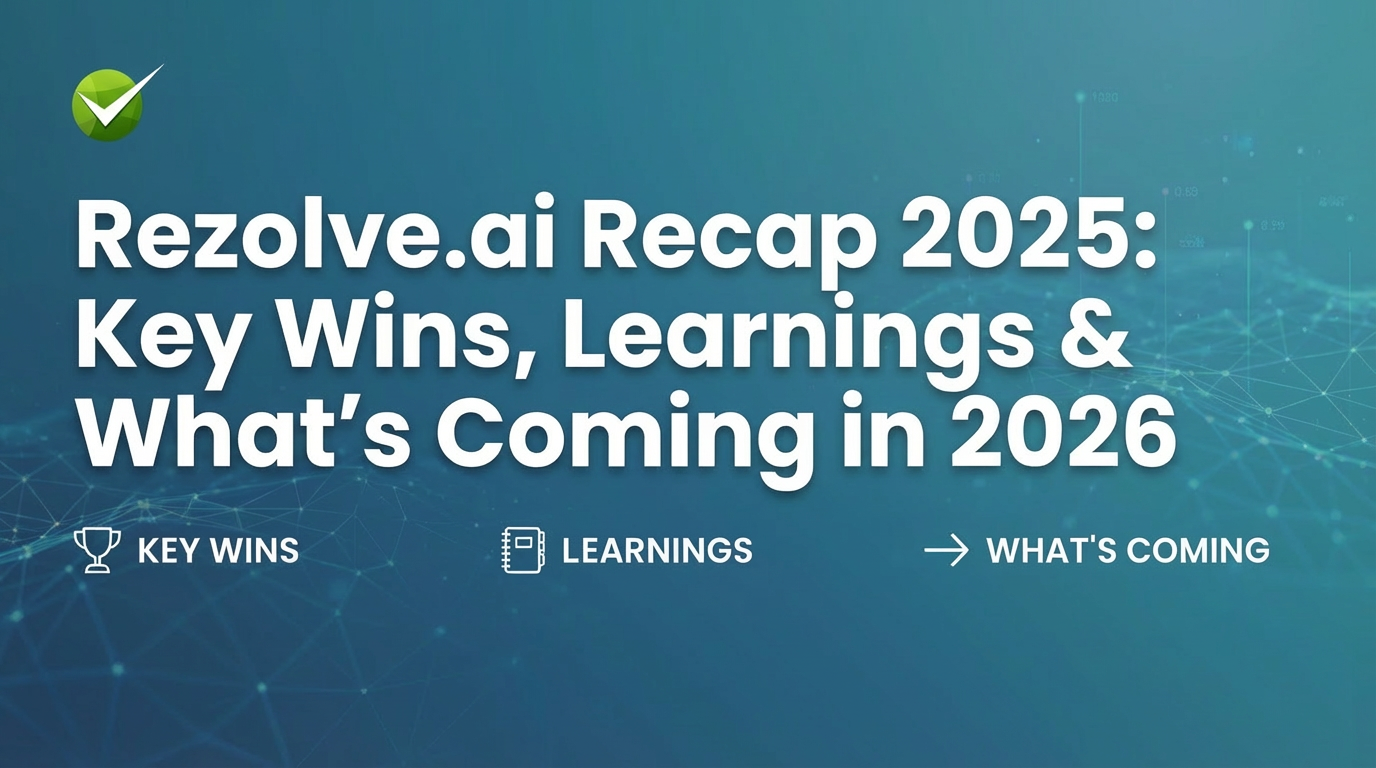As businesses become increasingly dependent on digital infrastructure, IT incidents are no longer minor inconveniences but serious threats to productivity, customer satisfaction, and revenue. In 2025, the complexity of IT incidents has escalated due to the widespread adoption of cloud computing, hybrid work models, and interconnected software ecosystems.
The stakes are higher than ever, and enterprises can no longer afford sluggish, manual incident management processes.
Efficient incident management has always been a critical component of IT operations, but with the current scale of operations, traditional methods struggle to keep up. Every minute of downtime results in lost revenue, frustrated customers, and increased pressure on IT teams. Organizations are now turning to AI-powered incident management software to tackle these challenges. AI-driven automation, predictive analytics, and self-healing capabilities are reshaping how incidents are detected, categorized, and resolved.
.avif)
But beyond the technical improvements, the real question for enterprises is: What is the return on investment (ROI) of AI-powered incident management software?
The answer lies in efficiency, cost savings, and strategic benefits. AI-driven incident management significantly reduces the time to resolve issues, minimizes reliance on large IT teams, and enhances customer satisfaction by providing faster, more accurate solutions. With businesses under constant pressure to optimize costs while maintaining high performance, AI-powered ITSM is becoming a necessity rather than an option.
Understanding AI in Incident Management
.avif)
AI incident management software is a modern evolution of traditional IT Service Management (ITSM) solutions, integrating machine learning, natural language processing, and automation to handle incidents with minimal human intervention. Unlike conventional ITSM tools that rely heavily on human decision-making and manual workflows, AI-powered solutions take a proactive approach, predicting and resolving incidents before they escalate.
A key differentiator between AI-driven incident management and traditional methods is the level of automation and intelligence applied at every stage of the incident lifecycle. Traditional ITSM relies on rule-based workflows, ticketing systems, and manual intervention from IT teams. AI, on the other hand, learns from past incidents, automates ticket resolution, and even prevents issues before they occur.
Key AI Capabilities in Incident Management:
- Automated Ticket Resolution: AI can classify, prioritize, and even resolve common IT issues without human intervention. This significantly reduces the workload of L1 support teams.
- Predictive Analytics: By analyzing historical data and system patterns, AI can predict potential failures and take preventive actions before an issue impacts operations.
- Intelligent Routing: AI optimally assigns tickets to the right teams or engineers based on urgency, complexity, and skillset, reducing resolution time.
- Sentiment Analysis: AI can assess employee or customer frustration levels based on ticket descriptions and escalate issues accordingly.
- Self-Healing Automation: AI-powered systems can take automated corrective actions, such as restarting services, reallocating resources, or applying security patches, without human involvement.
These capabilities translate into faster resolution times, reduced operational costs, and a superior employee and customer experience, all of which contribute to a high return on investment.
The Financial Impact: How AI Boosts ROI
.avif)
The core appeal of AI-powered incident management software lies in its ability to deliver measurable financial returns. Organizations adopting AI-driven ITSM solutions report significant cost savings, increased efficiency, and reduced operational risks. Here’s how AI incident management directly impacts the bottom line:
Reduction in Downtime Costs
Downtime is one of the most expensive consequences of IT incidents. According to industry reports, businesses can lose thousands, sometimes millions, of dollars per hour due to system outages. AI-driven incident management significantly reduces Mean Time to Resolution (MTTR) by automating detection, classification, and resolution processes.
For instance, a financial services firm that adopted AI-powered ITSM saw a 30% reduction in MTTR, saving hundreds of thousands of dollars annually by preventing lost transactions and improving system availability. AI’s predictive capabilities also minimize the chances of critical failures, further reducing potential downtime costs.
Lower Operational Costs
Traditional ITSM relies on large support teams to handle incoming tickets, troubleshoot issues, and escalate complex cases. AI-driven automation drastically cuts the need for manual intervention, enabling businesses to operate with leaner IT support teams.
Many organizations spend millions on L1 and L2 support each year. AI chatbots and self-healing automation reduce this dependency by handling a significant percentage of incidents autonomously. As a result, companies can save up to 40% on IT support costs, reallocating those resources toward innovation and strategic initiatives.
Improved Employee Productivity
When IT incidents occur, employees are often left waiting for resolution, leading to frustration and lost productivity. AI-powered ITSM ensures that routine issues—such as password resets, software access requests, or system performance problems—are resolved instantly.
With AI chatbots and virtual assistants integrated into communication platforms like Microsoft Teams or Slack, employees can get their issues resolved in seconds rather than waiting for IT support. This results in a direct increase in productivity, allowing employees to focus on value-generating tasks instead of dealing with IT roadblocks.
Enhanced Customer Satisfaction
In industries where customer experience is paramount, slow incident resolution can lead to reputation damage and lost revenue. Whether it’s an e-commerce website experiencing downtime or a banking app facing transaction failures, delayed resolutions frustrate customers and erode trust.
AI-powered incident management reduces response and resolution times, ensuring customers face minimal disruptions. Additionally, proactive issue prevention means that customers may never even experience an issue in the first place. This proactive approach builds long-term customer trust and loyalty, which directly impacts revenue growth.
Better Compliance and Risk Management
Regulatory compliance is a major concern for industries such as finance, healthcare, and telecommunications. Security incidents and compliance violations can lead to severe financial penalties and legal repercussions.
AI-powered ITSM solutions ensure that security patches are applied automatically, access logs are monitored in real-time, and compliance requirements are met without human oversight. By integrating AI-driven risk management, businesses reduce their exposure to cyber threats, regulatory fines, and compliance failures, ultimately safeguarding financial stability.
Measuring ROI: Key Metrics for 2025
.avif)
For organizations investing in AI-powered incident management software, measuring Return on Investment (ROI) is crucial. While traditional IT Service Management (ITSM) solutions have always had key performance indicators, AI-driven ITSM introduces new benchmarks that redefine operational efficiency. In 2025, enterprises use a combination of quantitative and qualitative metrics to evaluate the financial and functional impact of AI on IT operations.
Time Savings & Automation Rate
One of the most significant benefits of AI-driven incident management is the drastic reduction in manual effort. AI-powered automation handles everything from ticket categorization to resolution, eliminating repetitive tasks for IT teams. Solutions like Rezolve.ai’s Agentic AI 3.0 introduce intelligent automation, dynamically responding to IT issues based on historical data and live context.
An enterprise-grade AI incident management system can automate up to 80% of routine IT tasks, including software access requests, password resets, and system health checks. By reducing the number of human touchpoints, businesses save thousands of hours annually, translating into massive cost reductions.
Reduction in IT Support Costs
Every year, companies spend millions on IT support salaries, infrastructure, and ticketing systems. AI-powered automation drastically reduces the workload of L1 and L2 support teams, cutting operational expenses significantly. Enterprises leveraging Rezolve.ai’s Agentic AI 3.0 report up to 40% savings in IT support costs, as AI agents handle common issues without requiring human escalation.
Organizations also benefit from reduced costs related to onboarding new IT staff, retraining employees, and maintaining large support teams. The financial impact is immediate—companies can redirect saved resources into innovation, security, and customer experience improvements.
Incident Resolution Speed (MTTR Improvements)
Mean Time to Resolution (MTTR) is a critical KPI in IT incident management. A prolonged resolution time can lead to lost productivity, frustrated employees, and revenue loss. AI accelerates resolution speeds by:
- Automatically categorizing and prioritizing tickets based on urgency.
- Resolving repetitive IT issues autonomously with no human intervention.
- Routing complex issues to the right expert teams using AI-driven intelligent routing.
With Rezolve.ai’s Agentic AI 3.0, businesses see a 30-50% improvement in MTTR, directly reducing downtime-related losses. AI-powered systems don’t just react; they predict and prevent incidents before they escalate into serious disruptions.
Elavated End-User Satisfaction Scores
Employee and customer satisfaction is one of the strongest indicators of ITSM efficiency. Poor incident management leads to delays, frustration, and reduced trust in IT teams. AI-driven solutions ensure that:
- IT issues are resolved instantly through AI chatbots and automation.
- Employees receive proactive alerts before experiencing technical disruptions.
- System uptime and performance are optimized, reducing the number of reported issues.
With AI handling the majority of routine IT problems, companies report higher employee satisfaction scores (CSAT, NPS, or ITSM feedback ratings). Enterprises adopting Rezolve.ai’s Agentic AI 3.0 have noted significant improvements in IT service perception, as users receive instant, contextual support instead of waiting in long support queues.
Percentage of Automated Ticket Resolution
A key measure of AI efficiency is the percentage of incidents resolved autonomously. The best AI-driven incident management systems automate up to 70% of tickets, freeing up IT teams to focus on high-value problem-solving rather than routine troubleshooting.
With Rezolve.ai’s Agentic AI 3.0, enterprises leverage context-aware AI agents that autonomously handle IT issues from start to finish, reducing the burden on human support staff. This allows businesses to scale IT support without increasing headcount or costs.
Reduction in Security Breaches Due to AI-Driven Threat Detection
Cybersecurity threats are increasing in both volume and complexity, making AI-powered threat detection and incident response critical. AI in incident management continuously monitors IT infrastructure, detects anomalies, and prevents security breaches before they occur.
Real-World Applications of AI Incident Management Software
AI-driven incident management is no longer theoretical—they are already delivering proven ROI across multiple industries.
Financial Services
In the banking and financial sector, AI-powered ITSM can optimize IT operations by:
- Automating Incident Management – AI detects and resolves IT issues such as system outages, transaction failures, or access issues, minimizing service disruptions.
- Enhancing Cybersecurity – AI-driven ITSM helps identify security threats in real-time, automating responses to suspicious activities and safeguarding customer data.
- Reducing Operational Costs – Automated workflows for IT support tickets reduce manual efforts, accelerating resolutions and improving employee productivity.
Example: A multinational bank can use AI-driven ITSM to proactively monitor ATMs and online banking platforms, automatically resolving issues before customers experience downtime.
Healthcare
AI-driven ITSM ensures uninterrupted IT support for critical healthcare systems by:
- Ensuring System Uptime – AI automates the resolution of IT issues, preventing downtime in hospital management systems, EMRs, and telehealth platforms.
- Supporting Compliance & Data Security – AI ensures IT compliance with regulations like HIPAA by detecting and addressing vulnerabilities in real-time.
- Reducing Administrative Overhead – Automated ticket resolution and virtual AI agents help medical staff resolve technical issues quickly, allowing them to focus on patient care.
Example: A hospital can use AI-driven ITSM to automatically restore access to electronic health records (EHRs) for doctors and nurses if login credentials fail, ensuring uninterrupted patient care.
Manufacturing
In manufacturing, AI-powered ITSM improves operational efficiency and predictive maintenance by:
- Minimizing Downtime – AI monitors production line IT systems, automatically detecting and fixing issues to prevent costly disruptions.
- Predicting Equipment Failures – AI analyzes sensor data from machinery to predict failures before they occur, enabling proactive maintenance.
- Automating IT Support for Factory Workers – AI-powered virtual assistants help employees resolve IT issues, ensuring seamless manufacturing processes.
Example: A car manufacturing plant can implement AI-driven ITSM to monitor and automate the repair of industrial robots, preventing delays in production.
Retail & E-Commerce
AI-driven ITSM plays a critical role in managing IT operations for retail and e-commerce by:
- Handling High Traffic Spikes – AI predicts server loads during peak sales (e.g., Black Friday) and automatically scales resources to prevent downtime.
- Automating IT Support for Store Operations – AI quickly resolves IT issues related to POS systems, inventory tracking, and online payment failures.
- Enhancing Customer Experience – AI reduces delays in resolving backend IT issues, ensuring faster checkout processes and seamless online shopping experiences.
Example: A large e-commerce platform can use AI-driven ITSM to detect and reroute traffic spikes automatically, preventing website crashes during major sales events.
Future Outlook: AI Incident Management Beyond 2025
AI in incident management is evolving rapidly, with several exciting advancements on the horizon.
.avif)
Advancements in AI & Machine Learning for Incident Prediction
Next-generation AI will move beyond reactive automation and focus on proactive problem prevention. AI systems will predict potential system failures with greater accuracy, triggering self-healing mechanisms before users even notice an issue.
Integration with LLMs and Conversational AI
LLMs (Large Language Models) will enhance AI-driven ITSM platforms by understanding complex user queries, generating contextual responses, and offering intelligent recommendations. Conversational AI will feel more natural and human-like, further reducing dependency on IT support teams.
AI-Driven Incident Prevention and Self-Healing IT Ecosystems
AI will become fully autonomous, monitoring IT infrastructure 24/7 and automatically resolving issues before they escalate. Self-healing IT systems will be capable of:
- Diagnosing root causes of failures instantly.
- Deploying automated fixes with no human intervention.
- Continuously learning from past incidents to improve efficiency over time.
Closing Note
Businesses that invest in AI-driven ITSM today will lead the market tomorrow, optimizing costs, improving user experiences, and driving sustained long-term growth. By reducing IT costs, minimizing downtime, improving productivity, and enhancing security, AI delivers significant financial and operational benefits.
Organizations that leverage solutions like Rezolve.ai’s Agentic AI 3.0 gain a competitive edge by implementing autonomous, predictive, and self-healing IT ecosystems. The future of incident management isn’t just about resolving issues—it’s about preventing them entirely.





.webp)




.jpg)

.png)








.png)